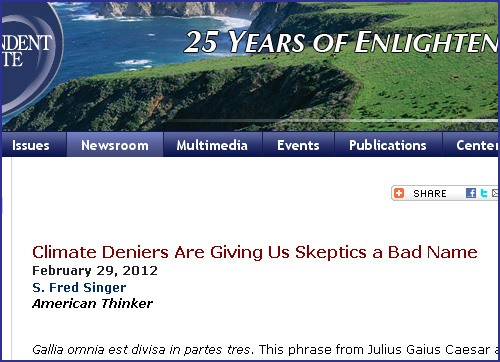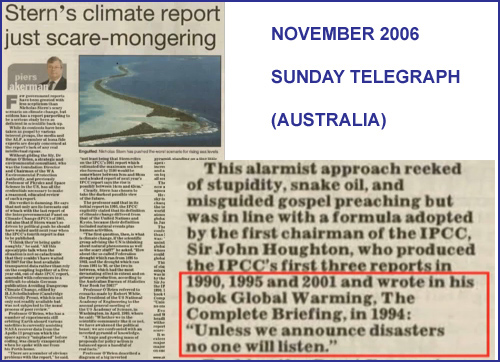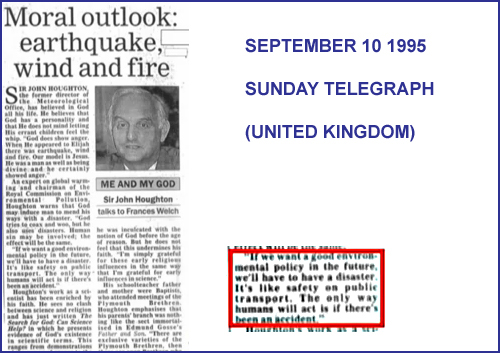Climate Deniers Are Giving Us Skeptics a Bad Name - Fred Singer
Posted on 17 March 2012 by John Mason
Somebody recently drew our attention to a provocatively-titled piece by Fred Singer on the website of the Independent Institute, another of those many political think-tanks over in the USA. We had a look at the piece and it turns out that it is another strange example of someone well-known over many years for their contrarian views on climate change (among other things) attempting to claim some kind of 'middle ground'. In short, as you will see below, he is saying, "most deniers [his term, which he uses a lot] are wrong, most climate scientists are wrong but I'm right".
It's not the first time we've seen someone trying to re-jig the debate, with a number of leading political anti-science activists now saying that they accept that the greenhouse effect exists and that temperatures are increased by Mankind's industrial emissions of carbon dioxide and other gases (but only by a teeny-weeny little bit). In doing so, they are putting ground between themselves and the rank-and-file who daily appear on comment threads to insist that the greenhouse effect doesn't exist, is a hoax and blah blah blah. It's as if they have realised that there is no longer any mileage in promoting that particular bunch of myths to policymakers and public alike, so that instead they are going for climate sensitivity as an alternative target. "Calling all think-tanks. Calling all think-tanks. Go to Plan B, repeat, go to Plan B."

OK then, let's take a closer look. All of Singer's text is in italics.
Singer begins by drawing up his view of where the 'balance' exists in the climate debate:
"On the one side are the “warmistas,” with fixed views about apocalyptic man-made global warming; at the other extreme are the “deniers.” Somewhere in the middle are climate skeptics."
He goes on:
"In principle, every true scientist must be a skeptic. That’s how we’re trained; we question experiments, and we question theories. We try to repeat or independently derive what we read in publications—just to make sure that no mistakes have been made."
That second quote is quite true and is the background behind every branch of science, from climatology to cardiology. But Singer then elaborates. On the 'warmistas' he says:
"I am going to resist the temptation to name names. But everyone working in the field knows who is a warmista, skeptic, or denier. The warmistas, generally speaking, populate the U.N.’s IPCC (Intergovernmental Panel on Climate Change) and subscribe to its conclusion that most of the temperature increase of the last century is due to carbon-dioxide emissions produced by the use of fossil fuels. At any rate, this is the conclusion of the most recent IPCC report, the fourth in a series, published in 2007."
He then goes on to churn out a tangled series of well-known and long-debunked climate-myths, to which, once they are unravelled, there are plenty of rebuttals here at Skeptical Science, for example here, here, here, here, here, here, here, here, here and here.
And then, his wrath falls upon the opposition: I've added the links below to his text, as they go to Skeptical Science pages that also deal with these myths in more detail. He writes:
"Now let me turn to the deniers. One of their favorite arguments is that the greenhouse effect does not exist at all because it violates the Second Law of Thermodynamics—i.e., one cannot transfer energy from a cold atmosphere to a warmer surface. It is surprising that this simplistic argument is used by physicists, and even by professors who teach thermodynamics. One can show them data of downwelling infrared radiation from CO2, water vapor, and clouds, which clearly impinge on the surface. But their minds are closed to any such evidence.
Then there is another group of deniers who accept the existence of the greenhouse effect but argue about the cause and effect of the observed increase of atmospheric carbon dioxide. One subgroup holds that CO2 levels were much higher in the 19th century, so there really hasn’t been a long-term increase from human activities. They even believe in a conspiracy to suppress these facts. Another subgroup accepts that CO2 levels are increasing in the 20th century but claims that the source is release of dissolved CO2 from the warming ocean. In other words, they argue that oceans warm first, which then causes the CO2 increase. In fact, such a phenomenon is observed in the ice-core record, where sudden temperature increases precede increases in CO2. While this fact is a good argument against the story put forth by Al Gore, it does not apply to the 20th century: isotopic and other evidence destroys their case.
Another subgroup simply says that the concentration of atmospheric CO2 is so small that they can’t see how it could possibly change global temperature. But laboratory data show that CO2 absorbs IR radiation very strongly. Another subgroup says that natural annual additions to atmospheric CO2 are many times greater than any human source; they ignore the natural sinks that have kept CO2 reasonably constant before humans started burning fossil fuels. Finally, there are the claims that major volcanic eruptions produce the equivalent of many years of human emission from fossil-fuel burning. To which I reply: OK, but show me a step increase in measured atmospheric CO2 related to a volcanic eruption."
To those who have been in this debate for a long time, some of the above are familiar, although the 19th Century one is novel. Most conspiracy-theories seem to be along the lines of global warming having some connection with a plot to install a socialist world government: given the great diversity of faiths and political beliefs from country to country around the world this would seem an implausibly ambitious project to pull off, even for the worst James Bond baddie, but I digress.
He could also have complained about another alternative viewpoint. TV weatherman Joe Bastardi recently opined:
“CO2 cannot cause global warming. I’ll tell you why. It doesn’t mix well with the atmosphere, for one. For two, its specific gravity is 1 1/2 times that of the rest of the atmosphere. It heats and cools much quicker. Its radiative processes are much different. So it cannot — it literally cannot cause global warming.”
The idea that CO2 doesn't mix well with the atmosphere is so far out that we don't actually have a rebuttal for it: it is only necessary to say it's just as well the gas does mix well in our dynamic atmosphere as a CO2-rich layer hugging the ground is not what we would want at all.
Anyway, Singer seems to have lost patience with both “sides”:
"I have concluded that we can accomplish very little with convinced warmistas and probably even less with true deniers. So we just make our measurements, perfect our theories, publish our work, and hope that in time the truth will out."
In view of the last sentence, and whilst the abandonment of a number of contrarian myths is an encouraging sign, it is odd that the piece finishes with five supposed quotes. Let's take one of them and examine it in detail:
"“Unless we announce disasters no one will listen.” —Sir John Houghton, First Chairman of the IPCC"
A Google of that reveals it has been copied and pasted far and wide across the Internet echo-chamber. So: where did it originate? Peter Hadfield wanted to know that whilst studying some of Christopher Monckton's output, and this is what he found. Its first appearance in that form was in an Australian Sunday Telegraph article in November, 2006:

But is that really what Houghton said? Er, no. The original goes back to an interview with him in the UK Daily Telegraph on September 10, 1995:

That's a bit fuzzy, so I'll retype it:
"If we want a good environmental policy in the future, we'll have to have a disaster. It's like safety on public transport. The only way humans will act is if there's been an accident."
Consider that for a moment. Is it not true? Here in the UK, exactly the same human traits led to the compulsory Ministry of Transport test that keeps lethally-dysfunctional vehicles off the road. It led to the outlawing of taking to the wheel when blind drunk. It has led to the banning of smoking in many public places (coincidentally Singer did a lot in the past for the pro-smoking lobby - is there a pattern here?). We do tend to legislate when bad things happen in order to try and reduce the risk of them happening again: in other words, we as a species are very good at bolting the proverbial stable door after the horse has gone.
But how did the error with the quote occur? The journalist who used it in the Australian Sunday Telegraph stated:

OK. That sort of thing happens in the blogosphere. So that's it, then, is it? Not quite: six years later, we still have Singer and others repeating the misquote without question. Just to requote him from the beginning of his article:
"We try to repeat or independently derive what we read in publications—just to make sure that no mistakes have been made."
Indeed, Mr Singer, and just one of those five quotes is evidence enough to demonstrate that you haven't. A true "skeptical scientist" would have checked that 'quote' before repeating it. It is to be hoped that, next time, you are a little more careful....































 Arguments
Arguments























 0
0  0
0






Comments